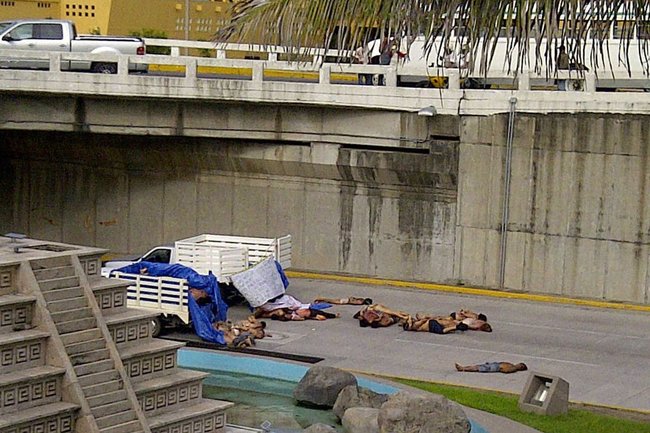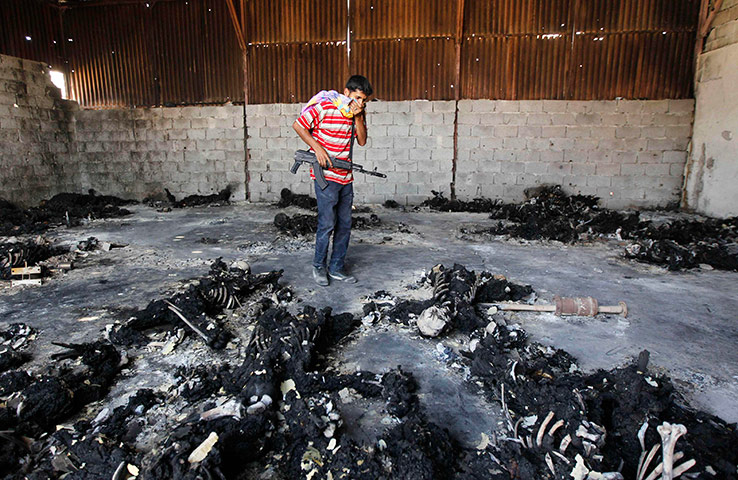Both Patti Smith and Don DeLillo have said that something to the effect that the key to civilization may lie in the transformation of waste. I assume they were talking about shit and bad food and everything else that might come under the label of garbage–except human beings. But people are called garbage and treated worse. Like this.
A drug cartel has dumped two truckloads of bodies on a road in Veracruz. The New York Times emphasized that bystanders provided updates on Twitter during the traffic delay. Really. That kind of moral and emotional insulation isn’t free, but there is plenty available. The unusually long distance between the bodies and the viewer helps as well. Perhaps for that reason, I find a forensic mentality also seems appropriate. Look closely and you can see that some of the men have their hands tied behind their backs, while all have been partially stripped. Criminal executions are fodder for a brazen display of power against an ineffectual state, while the yellow curb stands in for the tape that will mark the crime scene when the authorities do arrive.
Like the police, the spectator may want to dote on literal details: Have the bodies been moved? Was anything moved before the photo was taken? These questions can be the key to successful prosecution, but for those of us not working in criminal justice, they also become another way of distancing oneself emotionally from the horror, loss, indecency, and threat to civil society that this image represents.
Others may not have the luxury of distance.
The caption at the Guardian said that “a rebel fighter looks at the charred remains of burnt bodies at the Khamis 32 military encampment” in Tripoli, Libya. True enough, but the text is also a euphemism. He is looking, and he also is gagging, and that is the more important gesture here. He may be a young man, but it is more to the point to say that he is someone capable of an honest, humane reaction to the horror of war. His soft, civilian clothes and shoes and lack of a helmet testify to his amateur status, and, frankly, he is lucky that he is not yet battle-hardened enough to be insensitive to human remains. The question remains whether that has happened to us. By not being able to smell the charred flesh or stare into the body cavities while still glancing at the photograph, it becomes easy to react without feeling.
Sure, war is hell, including drug wars, but what about the steady destruction of human beings because of larger political, social, and economic failures? Think of the continuing violence in Mexico, Libya, Iraq, Afghanistan, Somalia, Congo, and many more areas where drug cartels, civil wars, mercenary armies, and the rest of anarchy’s legions are turning people into human waste. If nothing else, disposal could become a problem. Burnings don’t last long enough, mass graves can be dug up, drowned bodies wash ashore–you might as well let people live.
But they don’t let people live. One of the challenges civilization faces today is not becoming habituated to the insidious, localized, but persistent and awful ways that human beings are being transformed into waste. One could do worse than following the example provided by the ordinary individual in the second photograph: that is, to look at the carnage and choke on the close encounter with inhumanity.
Photographs by Veracruz en Red/European Pressphoto Agency and Louafi Larbi/Reuters. You can see more of the Libyan photos, along with comments that support my point that literalism can be a means for moral and emotional denial, here.


http://www.efn.org/~hkrieger/w775.jpg
The increasingly blurry line between real and fictional images of violence make “an honest, humane reaction to the horror of war” incredibly difficult. The rebel fighter plays a crucial role in the second picture by grounding the scene in reality. Without his presence, we are free to “react without feeling” in complete denial of what we are actually seeing.
For an disturbing example, try the following experiment. One of the photographs below shows the results of an atrocity, while the other comes from an online catalogue of halloween decorations. Without drawing on peripheral information like the actual URL, site title or web design, try to guess which is which:
http://tinyurl.com/5sdwu8j
http://tinyurl.com/62lbksf
The observer reminds us of the reality of the scene and acts as a model to cue our emotional response. In other words, we might only feel disgust when we see that someone else is disgusted. And that is absolutely disgusting.
The Veracruz photo reminded me of how terrorists acts extend over time. I wonder if the Tweeters who saw these bodies on the road imagined a past in which the bodies were stripped, bound, slaughtered, collected and then loaded onto trucks? Or a present moment when someone drove the trucks and abandoned them to create this grisly display. Finally, what of the future workers–law enforcement and civil servants–who will have to gather the victims, identify them, and inform their families? Some photos seem to capture a past moment, and freeze it, but this chilling image reminds me of even more gruesome moments that lead up to it, and the state’s continuing failure to clean up this kind of “mess”.
[…] The fact that Libyans have failed to distinguish themselves from the violence of their past existence under Gaddafi is disheartening. The images of this latest massacre demonstrate that war pays no attention to the morals of those who fight, and will continue to yield sad realities. The folks at NoCaptionNeeded say it best: “One of the challenges civilization faces today is not becoming habituated to the insidious, l… […]
nice
It matters a little whether we care or not about the destruction and horror that comes through war and violence because the people responsible for these violence and wars are brain washed long before and they can’t even understand the meanings of words like humanity let alone realize the value. As long as war exists humankind will never see justice, war will breed criminals and they’ll bring violence and thus humanity will one day cease to exist.